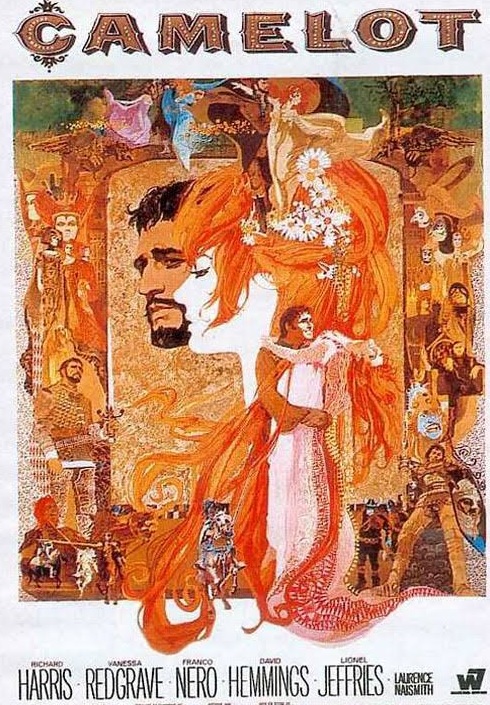I still remember as a kid when I was taken to see this movie “Camelot” as part of a school trip. I absolutely fell in love with not only the title song of the movie https://www.youtube.com/watch?v=N0Bp5odIZjQ but also the song “If ever I should leave you” https://www.youtube.com/watch?v=ATUjAT6Uvgw which touched my little kid heart tremendously and made a romantic out of me (which survives as a romantic to this day). Click on either of these two links to be taken to YouTube to listen to these wonderful songs and relive your past memories. Thankfully, of the main characters in the movie, Vanessa Redgrave is 86 years old and still alive, but sadly we lost Richard Harris in October of 2002. I find it sobering when I think that one of the characters of this movie which touched my young mind and heart has passed on.
“Camelot” is a timeless masterpiece released in 1967, directed by Joshua Logan and based on the 1960 Broadway musical of the same name, which itself draws inspiration from T.H. White’s novel “The Once and Future King.” The film unfolds the legendary tale of King Arthur and the Knights of the Round Table, offering a unique blend of romance, fantasy, and political intrigue that captivates audiences to this day.
At the heart of “Camelot” is the legendary love triangle between King Arthur (played by Richard Harris), Queen Guinevere (Vanessa Redgrave), and Sir Lancelot (Franco Nero). The film explores the complexities of love, loyalty, and the consequences of personal choices against the backdrop of Arthur’s vision for a utopian society based on justice, chivalry, and the rule of law.
The film’s narrative is driven by its characters, each bringing depth and nuance to the Arthurian legend. Richard Harris delivers a powerful performance as King Arthur, capturing the character’s idealistic vision and internal struggles. Vanessa Redgrave brings a compelling complexity to Queen Guinevere, torn between duty and desire, while Franco Nero’s portrayal of Sir Lancelot adds a layer of intensity and conflict to the storyline. The chemistry between the three leads is palpable, infusing the film with emotional resonance.
One of the film’s standout features is its lush and visually stunning cinematography. The majestic landscapes, intricate costumes, and elaborate set designs transport the audience to the mythical realm of Camelot. The film’s visual grandeur is complemented by Frederick A. Young’s cinematography, which skillfully captures the sweeping landscapes and intimate moments alike. The cinematography not only serves as a feast for the eyes but also contributes to the film’s overall immersive experience.
The musical score, composed by Frederick Loewe with lyrics by Alan Jay Lerner, is another of the film’s defining elements. The iconic songs, including “Camelot,” “The Lusty Month of May,” and “If Ever I Would Leave You,” enhance the emotional impact of key scenes and help to convey the characters’ innermost feelings. The music adds a layer of enchantment to the narrative, making it an integral part of the film’s enduring appeal.
Beyond its romantic elements, “Camelot” also explores themes of power, leadership, and the consequences of political decisions. King Arthur’s vision of Camelot as a beacon of justice and fairness is contrasted with the harsh realities of the world, highlighting the challenges of maintaining an idealistic kingdom in the face of human flaws and political intrigue. The film raises thought-provoking questions about the nature of leadership and the compromises that come with the pursuit of a noble vision.
“Camelot” is a product of its time, reflecting the cultural and political climate of the 1960s. The film’s release coincided with a period of social and political upheaval, and its themes of idealism, hope, and the struggle for a better world resonated with audiences seeking inspiration and meaning in turbulent times. The film’s message of hope and the enduring power of idealism continue to be relevant, making “Camelot” a timeless classic that transcends its historical context.
In conclusion, “Camelot” stands as a cinematic gem that weaves together the magic of Arthurian legend with compelling characters, lush visuals, and a memorable musical score. Its exploration of love, leadership, and the pursuit of an idealistic vision makes it a film that continues to captivate audiences decades after its release. As a timeless tale of romance, honor, and the enduring quest for a better world, “Camelot” remains a cinematic triumph that has left an indelible mark on the landscape of film history


Get involved!
Comments